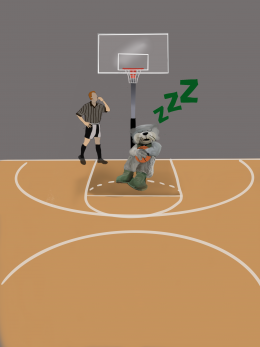
Sam Sessoms, arguably the best player on Binghamton University’s men’s basketball team, recently announced his decision to transfer to Penn State.
Having led the America East in points per game this past season, Sessoms first announced his impending departure on March 11, and shared news of his return to Pennsylvania, his home state, just two weeks later. In many ways, the saving grace of this year’s men’s basketball program transferring to a Big Ten school spells even greater trouble for future seasons, ones that may not find players as good as Sessoms coming to BU. Despite Sessoms’ skill, the BU men’s basketball team finished in last place in the AE this season, winning just four conference games and missing the conference tournament.
The blame for the team’s poor performance does not fall on Sessoms’ shoulders, however, nor should he be faulted for leaving. Rather, BU men’s basketball head coach Tommy Dempsey should be at fault. Dempsey needs to be held accountable for not bringing his team to heights greater than the very bottom of the conference on multiple accounts. In Dempsey’s eight years as head coach at BU, he has garnered just a .273 win percentage. The team has not had a winning record once under his leadership, and it has never finished higher than sixth in the AE under him.
Throughout this same period, Dempsey has made a great deal of money from his position. Being the head coach for BU’s men’s basketball team means earning more than $250,000, approximately half the salary of President Harvey Stenger and up to five times as much as the salaries of many professors. That salary is on par with that of other men’s basketball coaches at other SUNY schools, and seems to be the general going rate for a decent coach. But Dempsey has demonstrated that he is not even close to decent, and earning so much money despite a clear record of poor performances on the basketball court naturally raises some questions around his continued employment.
There’s no telling how much more damage could be done to the athletics program in the wake of Sessoms’ departure, but it’s not impossible to imagine other student-athletes transferring out too — and we wouldn’t blame them for it, either. The Editorial Board calls on the administration to reconsider Dempsey’s position as head coach of the men’s basketball team. It is not a recommendation we take lightly, but with his current record, it would appear this would be the first step in addressing the many problems facing BU’s men’s basketball program.
Director of Athletics Patrick Elliot has also demonstrated some serious leadership concerns, as he has not garnered enough enthusiasm among the student body for the department and has left several programs with little success.
An upheaval of the men’s basketball coaching staff could provide a crucial shift in both the culture and the perception of the BU athletics department. Several teams within the department have seen impressive seasons over the past few years, including baseball, women’s basketball and wrestling, and have been given far less attention than men’s basketball. Bethann Shapiro Ord, head coach of the women’s basketball team, has led the team to its highest single-season win total in the team’s Division I history this past season. The team also had a winning record in two of its last three years playing. Shapiro Ord proves that exemplary leadership is possible within her department — but the same can’t be said with Dempsey spearheading the men’s team.
It is worth noting that the women’s team finds itself in not too dissimilar a position, with star point guard Kai Moon graduating, along with fellow senior guards Carly Boland and Karlee Krchnavi. Moon led the AE conference with points scored this year and scored 1,456 career points, making her fifth of all time at BU. She is not going to leave easy shoes to fill. However, the Editorial Board feels that under Shapiro Ord’s leadership, the team has a good chance at maintaining or even exceeding its current level of success.
Being a premier SUNY school extends to fields outside of research and admissions statistics, and that cannot happen under the current leadership of the department. It’s no secret that a school like Penn State is going to be hard, if not impossible to contend with at BU’s current size, but a revamping of the athletics program could put us on a path toward equal footing with other SUNYs like Stony Brook and Albany — both long-time rivals.
Athletics can also be an important recruiting tool for universities, allowing for an influx of incoming students, athletes and sports fan alike, and any BU student could tell you there isn’t a great deal of school pride here. If nothing else will convince administrators to pursue a change in the athletics department, perhaps the idea that the University’s wallet could be fattened with better team performance will.
It’s also important to note that a lack of school spirit is far from the reason why BU’s athletics performance is sometimes so abysmal. Good athletics programs generate school pride unlike any other part of our academic institutions can. The ball is in the administration’s court now — let’s hope they don’t drop it.


